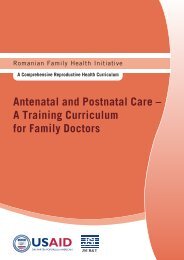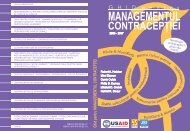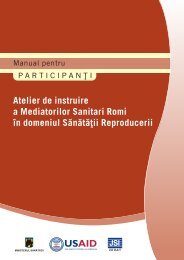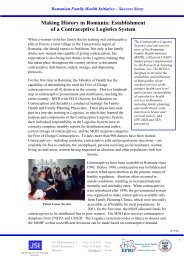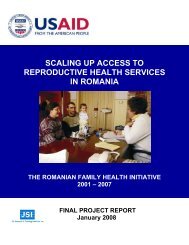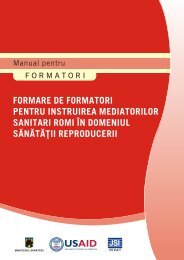Training of Roma Health Mediators in Reproductive Health
Training of Roma Health Mediators in Reproductive Health
Training of Roma Health Mediators in Reproductive Health
You also want an ePaper? Increase the reach of your titles
YUMPU automatically turns print PDFs into web optimized ePapers that Google loves.
6. If she recently had a miscarriage or an abortion, were her cycles between 26 and<br />
32 days before gett<strong>in</strong>g pregnant?<br />
This question is designed to determ<strong>in</strong>e if the client’s menstrual cycles prior to gett<strong>in</strong>g<br />
pregnant were between 26 and 32 days. If yes, the woman can beg<strong>in</strong> us<strong>in</strong>g the SDM on<br />
the day her next period starts.<br />
Recommended questions for a woman with a recent miscarriage or abortion:<br />
- Before you were pregnant, did your periods come when you expected<br />
them?<br />
- Has any bleed<strong>in</strong>g related to the loss <strong>of</strong> your pregnancy stopped?<br />
- Have you started hav<strong>in</strong>g your period aga<strong>in</strong>?<br />
Couples who can avoid unprotected sex dur<strong>in</strong>g the fertile days<br />
This section <strong>of</strong> the checklist is designed to identify and expla<strong>in</strong> issues related to the<br />
couple relationship and how to assess whether they can use the method effectively. In<br />
general, it is designed to help the provider determ<strong>in</strong>e if the method is appropriate for the<br />
couple based on relationship issues and the degree <strong>of</strong> communication that exists, whether<br />
there is any risk <strong>of</strong> STIs, and how likely they are to be able to manage the woman’s<br />
fertile days.<br />
7. Do both partners want to avoid pregnancy at this time?<br />
This question is important to confirm that both partners do not want a pregnancy at this<br />
time and whether both partners would agree to use the method and be motivated to avoid<br />
unprotected sex. A conflict between partners regard<strong>in</strong>g pregnancy <strong>in</strong>tentions would make<br />
it very difficult for the couple to avoid unprotected sex on the white bead days, an<br />
essential requirement <strong>of</strong> the SDM. If the couple does not have open communication<br />
regard<strong>in</strong>g pregnancy <strong>in</strong>tentions, or does not agree on pregnancy avoidance, then the SDM<br />
may be a difficult method for them to use.<br />
Recommended question:<br />
- Are you able to discuss openly and freely with your partner whether you<br />
want to have children?<br />
- Have you agreed that it is important to both <strong>of</strong> you not to get pregnant<br />
right now?<br />
- Have you discussed us<strong>in</strong>g a family plann<strong>in</strong>g method?<br />
8. Do both partners th<strong>in</strong>k they can avoid unprotected sex on days when the woman<br />
can get pregnant?<br />
This question is designed to help the user and provider identify whether the couple might<br />
have problems avoid<strong>in</strong>g unprotected sex. The question is also meant to identify whether<br />
the woman is able to tell her partner on any given day whether or not she wants to have<br />
sex and whether her partner respects and supports that decision.<br />
Recommended questions:<br />
- How do you th<strong>in</strong>k your partner would feel about avoid<strong>in</strong>g unprotected sex<br />
on the white-bead days?<br />
- What about you?<br />
95<br />
RFHI <strong>Tra<strong>in</strong><strong>in</strong>g</strong> <strong>of</strong> RHMs <strong>in</strong> <strong>Reproductive</strong> <strong>Health</strong> Session 5: SDM



